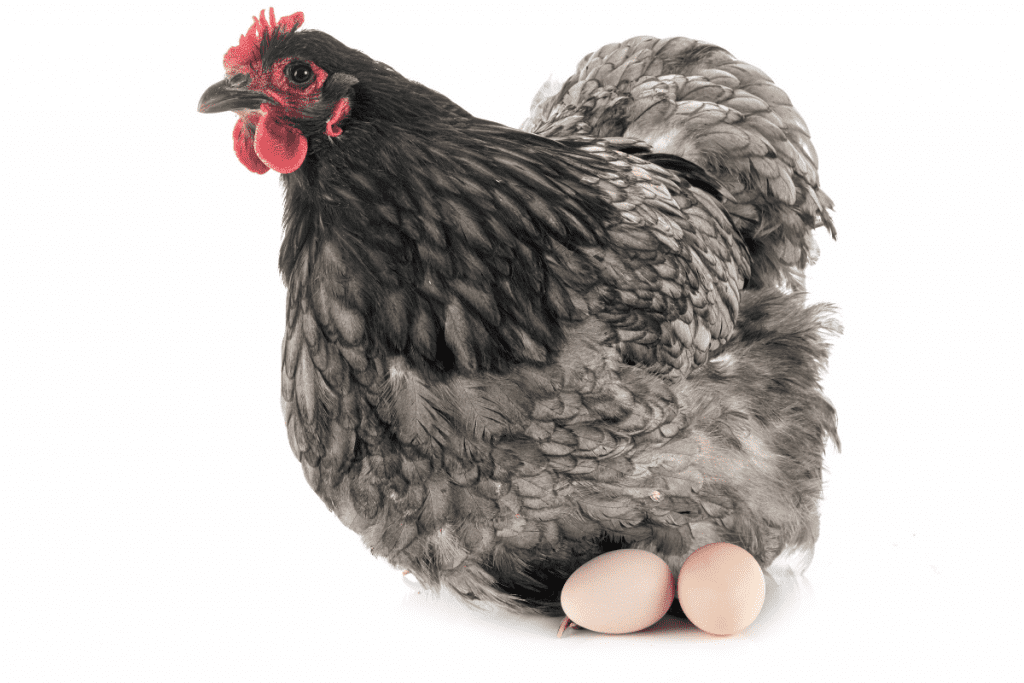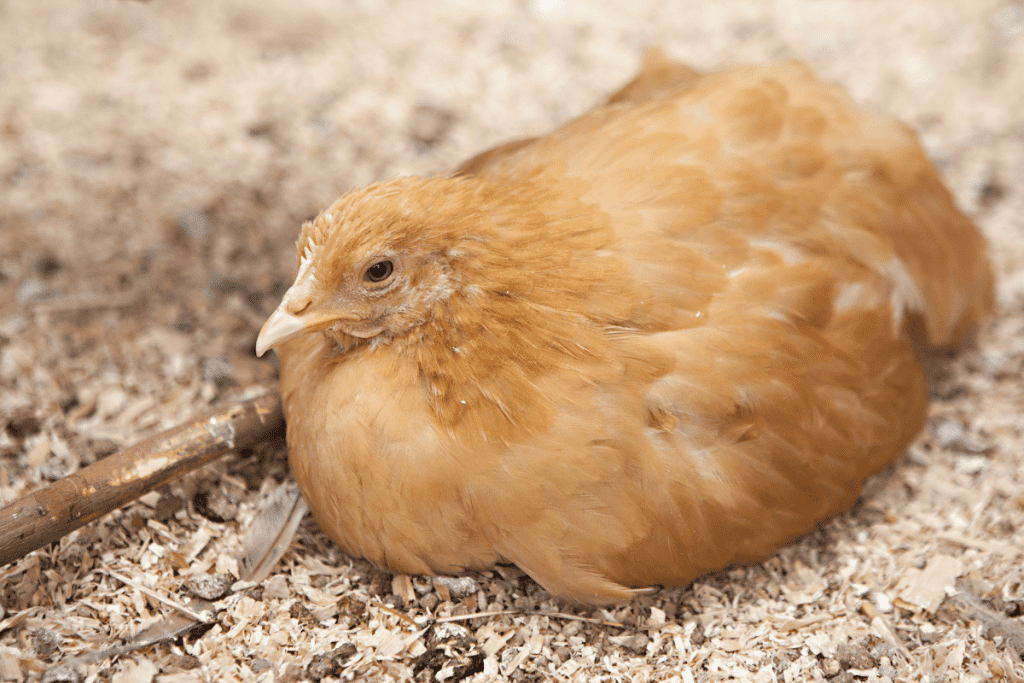The Buff Orpington is an incredibly popular bird for families and a great choice for poultry keepers.
They are generally hardy, healthy birds.
They have beautiful, dense feathers and mellow temperaments.
If you’re a chicken owner looking for safe chicken breeds for your children and the other birds in your coop, Orpingtons definitely deserve a place on your list.
Possibly the best part, though, is what great layers they are!
I’m sure you already see why these birds are so popular among chicken owners.
If you want to learn more about Buff Orpingtons and their eggs and laying habits, keep reading!

Table of Contents
ToggleBasic Facts About Orpington Eggs
Buff Orpingtons lay up to 280 eggs per year. All varieties of Orpingtons are excellent layers that produce brown eggs of a medium to large size. They lay in the winter, and their dense feathering makes them more resistant to the cold than many other chicken breeds.
As previously stated, Buff Orpingtons lay medium to large brown eggs.
The chickens themselves are pretty big.
Roosters can weigh in at up to ten pounds if you allow them to continue growing.
The range for Orpingtons goes from 7.5-10 pounds, though.
Don’t worry about their size, though.
These chickens have a very docile temperament and won’t pose any threat when in the company of humans or other chickens.
They make wonderful mothers when you want to hatch their eggs.
It isn’t hard to get an Orpington hen to brood.
Conversely, she won’t protect her eggs with enough ferocity to get you hurt when you open the nesting boxes.
While Orpington chickens come in various colors (including Black Orpingtons, which you may have heard of before), the most common is the Buff Orpington.
These birdies are so loved by chicken keepers, whether for their dense, smooth feathers or their egg-laying capabilities.
They are also widely regarded as a great choice for beginners!
When Do Buff Orpington Chickens Lay Eggs?
Buff Orpingtons generally start to lay eggs at around 5-7 months of age. This is slightly later than some other layer breeds, which average between 4-5 months.
No two chickens will start at the same time.
If your Orpingtons are at the age a lot of your other birds started laying, don’t worry.
It’s natural for them to take an extra month or two before they begin laying.
To quell your worries, look for signs they’re going to lay soon.
Their combs and wattles will start to look redder as they approach the stage of development you’re looking for.
They will also squat more frequently, like preparing to lay an egg.
If you see these things happening, your chicken is almost ready to start laying!
How Many Eggs Do Buff Orpington Chickens Lay?
In a year’s time, Buff Orpingtons can lay anywhere from 150 to almost 300 eggs. The average tends to be between 200 and 280. This translates to about 4-5 eggs per week.
These numbers are impressive already.
But what’s particularly nice about Orpingtons is their ability to lay in the winter.
They need supplemental light like many chicken breeds do because the decreased sunlight in the colder months is bad for egg production.
However, Orpington chickens are hardy.
Their dense feathers make it easier for them to survive the cold, which is why they are so popular, especially in the northern states.
Provided you give them the artificial light they need, your Orpington birds can lay big, brown eggs for you through the winter.
How Many Years Do Buff Orpington Chickens Lay Eggs?
Buff Orpington chickens lay eggs for around 2-3 years. After 3 years, it is safe to assume your Orpingtons will begin to lay fewer and fewer eggs. You may be able to get a full 3 years, though, of them laying up to 5 eggs every week if you take adequate care of them.
The average life expectancy for this bird is 8-9 years, which is pretty standard among chickens.
This means they will produce their maximum number of eggs per week for about one-third of their lifespan.
They don’t just quit after those first few years, though.
They will likely continue to lay eggs for at least a few more years.
You just won’t be able to count on such impressive egg production from them anymore.
How Often Do Buff Orpington Chickens Lay Eggs?

Buff Orpingtons lay eggs about every other day or a little more often. They lay around 4-5 eggs each week. So, while they don’t lay daily, they produce eggs frequently.
Remember, though, this rate can change when temperatures get extreme, feed is not up to snuff, or your birds have any health problems.
Orpingtons, in particular, have a hard time in the summer.
Those thick feathers we love so much in the winter work against your birdies when it gets exceptionally hot outside.
Remedy this by ensuring plenty of shade and cool water available to them on especially warm days.
It isn’t very hard for their bodies to overheat, which is not good for egg production.
How Long Does It Take for Buff Orpington Chickens to Lay Eggs?
It takes Buff Orpington chickens about 1-2 days to lay each egg once they start laying at around 6 months. They lay eggs on an almost-daily basis, so expect 4-5 eggs per week from them.
This trait is definitely in their favor!
Compared, for example, with the Brahma chicken, Orpingtons lay about 2 more eggs every week.
In a year, those additional eggs will sum up to over 100!
Are Buff Orpington Chickens Good Layers?
Buff Orpingtons are considered some of the best laying hens, with Rhode Island Red and Sussex birds. They lay almost daily and will somewhat consistently lay eggs even through the winter.
Of course, it would be lovely to have a flock of birds who were daily layers.
But, in reality, the breed standards of Orpingtons are very high compared with several other chicken breeds.
Furthermore, their eggs are on the larger side, a bonus in my book!
How Do I Increase Buff Orpington Egg Production?
To increase Buff Orpington egg production in the summer, make sure your hens have a way to cool off. In the winter, grant them access to artificial light as their bodies need this to keep producing eggs. Otherwise, supplement their feed with protein and calcium to help your birds.
Orpingtons don’t require much extra work to lay plenty of eggs.
However, if you notice your hens are slacking off a bit, illness, infection, and nutrient deficiencies are all common culprits.
If necessary, don’t be afraid to change to a different feed or add a regular supplement to their diet.
Just do your research before making any major changes.
The last thing you want to do is set your hens back even further.
Note on Illness and Infection in Orpingtons
Orpington chickens’ dense feathering makes them more susceptible to problems with mites and lice.
If you notice that your Orpington hens aren’t laying as many eggs as usual, it’s a good idea to check them for mites before changing anything else.
It’s a pretty common problem for them to experience.
It will save you some grief in the future to do a check right off the bat before you spend time and money on other ways to increase egg production.
Are Orpington Chickens Broody?
Orpingtons go broody often enough to make lovely, attentive mothers. They are happy to sit on eggs until they hatch. But, on the other hand, they won’t attack you for coming near their eggs.
Their friendly nature extends to humans and other birds alike.
So, Buff Orpingtons act as good, broody mothers without endangering you, your family, or your other birds.
Another cool thing about these beauties is that their broad bodies allow them to cover more eggs at once.
This is a good hen for you if you want to hatch more eggs at once.
An even bigger hen is the Brahma chicken, which is another broody bird if this is what you’re looking for in your next chicken friend.
These girls are not an aggressive breed either, so they’re a wonderful addition to your coop.
A big difference, though, is Orpingtons lay more eggs every week than Brahmas do.
How Long Does It Take Orpington Eggs to Hatch?
Orpington eggs hatch after about 21 days, which is standard for most breeds of chicken. It is normal for them to hatch a few days early or late, so don’t be alarmed if this is the case with your birds.
If you use an incubator, temperature changes may lengthen the time it takes for them to hatch.
You don’t need to worry until days 25-26.
Do Buff Orpingtons and Black Orpingtons Lay Different Eggs?
As cool as it would be to have two Orpingtons lay completely different types of eggs, it just doesn’t happen. All Orpingtons lay light brown eggs of a medium to large size.
If you’re looking for a rainbow of egg colors, there are some popular chicken breeds such as the Ameraucana, those birdies who are known for their beautiful green eggs.
How useful was this post?
Click on a star to rate it!
We are sorry that this post was not useful for you!
Let us improve this post!
Tell us how we can improve this post?
